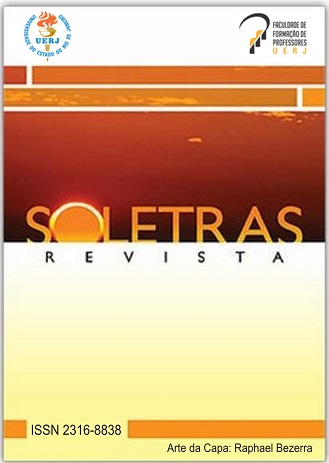Pelas veredas da ironia: o homoerotismo em O pecado de João Agonia e O beijo no asfalto
DOI:
https://doi.org/10.12957/soletras.2012.3843Abstract
Resumo: Sob a perspectiva comparatista, analisamos os diferentes caminhos tomados por Nelson Rodrigues, dramaturgo brasileiro, e Bernardo Santareno, teatrólogo português, naabordagem do homoerotismo em O beijo no asfalto e O pecado de João Agonia, respectivamente. Com interesse em detectar as diferentes configurações do tema e da linguagem discursiva, pretende-se verificar como a ironia, além de estar inserida já na ousadia em se abordar a temática, está presente em seus textos dramáticos. Mesmo trazendo este aspecto, ou justamente por trazê-lo, as configurações homoeróticas masculinas presentes nos textos dramáticos apontam para o contexto sociocultural, para os resquícios do preconceito
que o homoerotismo carrega e que, ao mesmo tempo, faz com que os indivíduos o neguem.
Palavras-chave: Bernardo Santareno. Nelson Rodrigues. Ironia. Homoerotismo.
On the paths of irony: homoeroticism in O pecado de João Agonia and O beijo no asfalto
Abstract: Under the comparative perspective, we aim to analyze the different paths taken by Nelson Rodrigues, Brazilian playwright, and Bernardo Santareno, Portuguese playwright, as
to the approach of homoeroticism in O beijo no asfalto and O pecado de João Agonia, respectively. With the goal of dettecting different configurations of the theme and of the discursive language, we intend to check how the irony, in addition to being inserted already in the boldness in addressing the issue, is present in those dramatic texts. Even for bringing this aspect, or exactly for bringing it about, the configurations of male homoeroticism present in the dramatic texts point at the socio-cultural context, to the remnants of prejudice that
homoeroticism loads and at the same time, makes individuals deny it.
Key words: Bernardo Santareno. Nelson Rodrigues. Irony. Homoeroticism.
Downloads
Published
Issue
Section
License
The approval of the article implies the immediate and free transfer of the publication rights in this journal. The author (s) authorize the Postgraduate Program in Literature and Linguistics (PPLIN) to reproduce it and publish it in Revista SOLETRAS, understanding the terms "reproduction" and "publication" in accordance with Definition of article 5 of Law 9610/98. The author (s) will continue to own the copyright for subsequent publications. The article can be accessed by the world wide web (http://www.e-publicacoes.uerj.br/index.php/soletras), being allowed, free of charge, the consultation and the reproduction of copy of the article for own use. Cases of plagiarism or any illegalities in the submitted texts are the sole responsibility of their authors.



